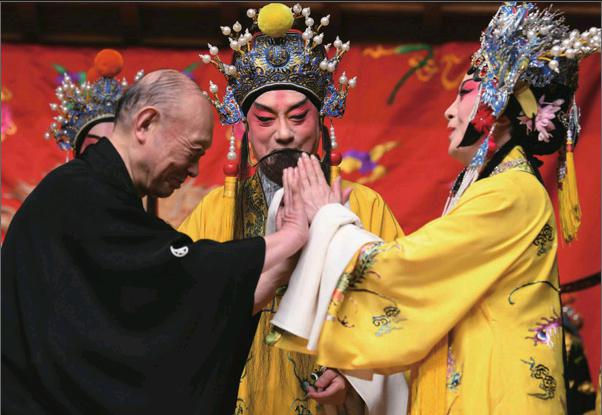Tottering Forward
By+Shi+Yongming

The China-Japan relationship has been in stalemate for the past several years due to Japanese Prime Minister Shinzo Abes persistent tough stance on China. In 2017, the situation showed some signs of change as Abe lowered his antiChina rhetoric. The development provides both sides with expectations for an improvement of their bilateral relations in 2018. In spite of expectations for thawing relations, Abes previous China policy has caused lots of systematic problems for the long-term development of China-Japan relations. The Abe administration still needs to show sincerity and make pragmatic efforts to bring the bilateral relations back to the right track.
Abes policy adjustment
The China-Japan relationship was filled with the smell of gunpowder in 2016. Japan began to implement its new security laws that year, which allow the countrys soldiers to fight in international conflicts. Previously, the nations pacifi st constitution banned the defeated country from fighting overseas, and only kept a self-defense force. The Abe administration attempted to use its China policy as a testing ground by taking on an adversarial stance against China on the South China Sea issue. In the East China Sea, Japanese military aircraft frequently made risky harassing moves toward Chinese jets passing through international air space over the Miyako Strait, causing tension and friction.
Unfortunately, Abes rash moves in security issues brought little pragmatic benefi t. Besides the failed China policy, the Abe administration also met setbacks in its dealings with relations with other major powers. Its attempt to sow discord between China and Russia ended in vain, while its Asia-Pacifi c economic and security strategy met “Trump shock.” Then newly elected U.S. President Donald Trump on the one hand supported Abes collective defense move to get reciprocal trade benefi ts from Japan, while on the other hand he threatened to withdraw from the Trans-Pacific Partnership (TPP) agreement, on which Abe had placed great hope. Attempting to change Trumps mind on the TPP, Abe flied to the United States to meet Trump regardless of basic diplomatic formalities, since Barack Obama was still in power. But to the Japanese prime ministers great disappointment, Trump not only announced the U.S. withdrawal from the TPP soon after taking offi ce, but also abandoned Obamas“pivot to Asia” policy in which Japan is a key player to contain China.
While encountering diplomatic setbacks, Abes domestic support also met a sharp decline. Then Defense Minister Tomomi Inada, who was seen as a potential successor to Abe, had to resign due to her inappropriate words and acts in the Tokyo metropolitan elections and the Japanese military scandal in South Sudan, triggering a cabinet reshuffl e of the Abe administra- tion; meanwhile, Abes entanglement in land-sale scandals resulted in his approval rating becoming trapped in a continuing decline.endprint
China, which has been regarded as a “strategic rival” of Japan by Abe, has achieved steady growth in spite of widespread suspicion of an economic collapse. The China-proposed Belt and Road Initiative, though long criticized by the United States and Japan, has been welcomed by more and more countries. Even Washington changed its attitude, claiming that it has realized the importance of the initiative. Besides, the China-led Asian Infrastructure Investment Bank also attracted wide attention from the international community, and around 60 countries and regions applied to be founding members of the bank.
It is against this backdrop that the Abe administration showed interest in improving relations with China. Last May, Abe sent a delegation to attend the Belt and Road Forum for International Cooperation in Beijing, signaling a major step to create an environment for improving China-Japan ties. But, the most notable signal was a letter from Abe delivered by Toshihiro Nikai, Secretary-General of Japans ruling Liberal Democratic Party and head of the Japanese delegation to the Belt and Road forum, to Chinese President Xi Jinping.
A makeshift or strategic adjustment?
According to Japanese media, Abes letter to President Xi had four major points: wishing to establish a stable friendship, calling for an early realization of top-level mutual visits, working closely on Korean Peninsula issues and Japans readiness to cooperate on the Belt and Road Initiative.
The most critical content of the letter was the wish for the two nations to establish a stable friendship. In fact, the Chinese Government has been committed to developing a friendly China-Japan relationship. In May 2015, a Japanese delegation of about 3,000 people attended an event at Beijings Great Hall of the People aimed at promoting friendly cooperation between the two countries, during which President Xi appeared as a surprise guest. When addressing the event, Xi said that China attaches great importance to the relationship and would like to work with the Japanese side to promote good neighborly relations and cooperation. Despite twists and turns, China has always adhered to this policy and will never change it in the future.
In contrast, Abes China policy causes the current bilateral stalemate. When he was fi rst sworn in as Japans prime minister, Abe denied theoretically the rationality for developing a friendly China-Japan relationship. His values-oriented foreign policy and national interest-driven pragmatism took a toll in China-Japan relations.endprint
In this context, although Abes recent adjustment of his China policy has sent a positive signal, it also leaves the international community with a question: Is it just a temporary expedient he was forced to take due to the current situation, or a real strategic adjustment?
To completely reassure the international community, Abe still needs to ravel out three problems.
First, Abe should expound clearly his foreign policy and the basic principle for developing China-Japan relations, defining the concept of China-Japan friendship.
Second, his right-wing policy has deeply affected Japans domestic public opinion environment. Now, “China-Japan friendship” almost becomes a taboo topic in Japanese media. Even as the panda cub Xiangxiang in Tokyos Ueno Zoo was widely welcomed by the Japanese public, some Japanese TV programs implied that China was employing the panda as a “political weapon.” Such mentality gets in the way of improvement of China-Japan relations.
Last, together with Trump, Abe pushed forward an Indo-Pacific strategy last autumn which, similar to his so-called“Security Diamond” strategy, is also be- lieved to be targeted at countering Chinas growing influence. Though Japans Kyodo News Agency reported that Abe “believes Japan will be able to cooperate well with China, which has been pushing forward the Belt and Road Initiative, while we are pursuing a strategy to achieve a free and open Indo-Pacifi c region,” Abe himself has not declared such a view publicly on international occasions. If Abe has the sincerity to improve China-Japan relations, he needs not only to illustrate clearly his foreign policies, but also to take concrete steps.
The China-Japan relationship is currently mired in a strategic dilemma set by the Japanese prime minister. It is a positive move that Abe has signaled a wish to improve the bilateral ties. It takes courage to do s o.endprint

